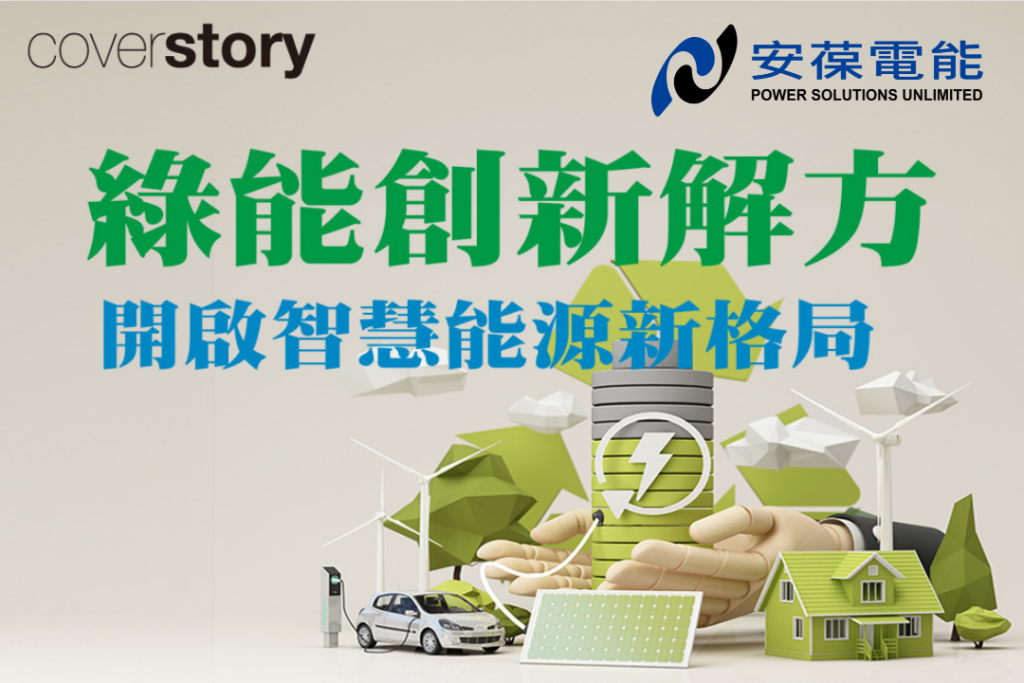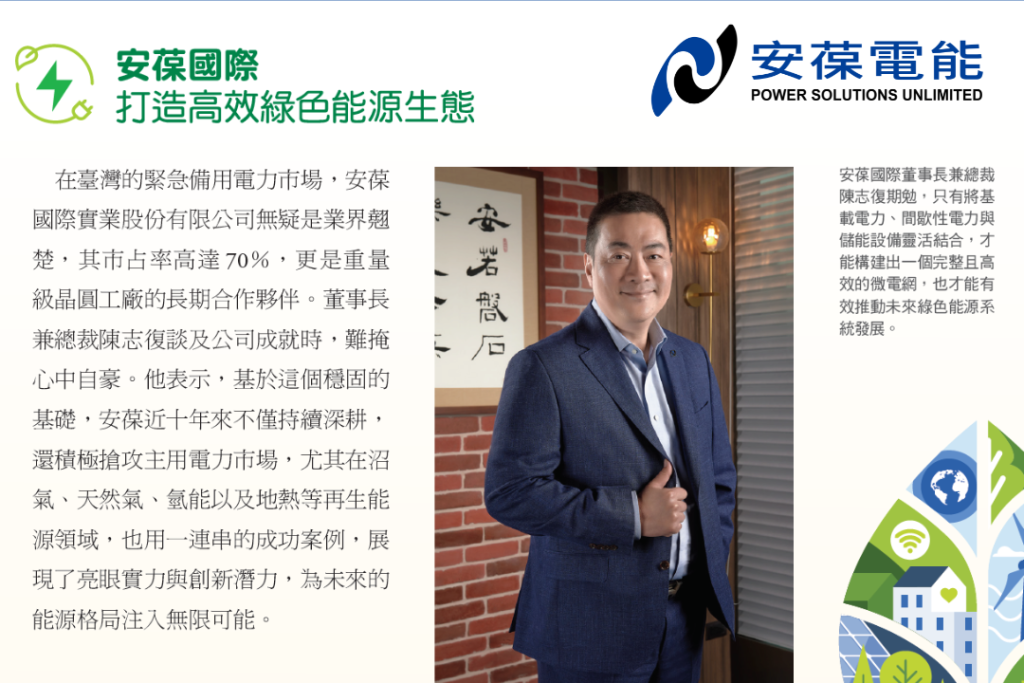

Within the industrial landscape of Taiwan, Trade Insight (經貿透視) speaks with quiet authority. Guided by the Ministry of Economic Affairs (MOEA), it doesn’t chase trends. It documents those who shape them.
This month, AMPOWER finds itself not in the spotlight, but in a rare kind of conversation: one that sees beyond headlines and into the architecture of what we build. It is an absolute honor to be featured, and here’s how Trade Magazine traces our journey:
💡 Where We Started
We began by building backup power systems for semiconductor fabs in Taiwan, projects that may not make the news, but keep entire industries running—30 years and counting, currently commanding a remarkable 70% market share.
🔋 How We’ve Grown
Over the years, we’ve expanded into on-site energy systems: distributed generation, CHP systems, microgrids, hydrogen power. Reliable, efficient, and built for the needs of enterprises in Taiwan in the midst of the energy crisis and pressing sustainability goals.
🌱 What We’re Building Today
From transforming farm animal wastewater into biogas power to harnessing industrial waste hydrogen for energy efficiency, advancing geothermal power, and developing independent tri-generation systems—our projects are already running, not just in planning.
🏗️ What Sets Us Apart
We’re a system integrator. That means we don’t just sell products, we design entire energy ecosystems. By keeping supply chains local to Taiwan, we keep everything adaptable, repairable, and truly independent.
🌏 Why It Matters
Energy independence is no longer a future idea. It’s a present-day need as energy issues escalate. And we strive to do what it takes to build it from within, providing sustainable energy-resilient systems for enterprises.
We’re grateful to be included in Trade Insight—now available in print and digitally.
You can also read it below:
AMPOWER INTERNATIONAL ENTERPRISE
As Taiwan faces mounting pressure to decarbonize and decentralize its energy supply, a once-modest power systems company has emerged as a key player in the country’s green energy future. AMPOWER, long known as the dominant force in Taiwan’s emergency backup power market, is now spearheading efforts to build what it calls a high-efficiency, locally sustained energy ecosystem—one that could reshape how the island powers its homes, hospitals, and chip fabs.
Founded in 1994 as a generator equipment distributor, AMPOWER now commands a 70% share of the backup power market in Taiwan and counts some of the world’s leading semiconductor manufacturers as long-term clients. But in recent years, it has turned its focus toward primary power, specifically toward decentralized energy solutions that combine renewables, smart grids, and fuel-efficient cogeneration systems.
AMPOWER’s foray into renewable energy has included successful deployments in biogas, hydrogen, natural gas, and geothermal power generation. The company’s work has transformed sites like the Yunlin pig farm—home to 30,000 to 40,000 heads of livestock—into clean energy producers through high-efficiency biogas systems. Other major partners include Innolux, Tung Ho Steel, Fun Spring Circutech (a YFY Inc. subsidiary), and the Taoyuan Biomass Energy Center.
In October 2023, AMPOWER made headlines by converting industrial hydrogen waste into electricity for Semisils using a German-made internal combustion engine. This achievement was a first for Taiwan—and, according to the manufacturer, a first for the world.
“If all of Taiwan’s industrial hydrogen waste generated in 2023 were collected and used for power generation, we could reach a total of 480 MW—equivalent to about 60% of the country’s wind power or 29% of its solar power output,” Chairman Chen notes. “What’s more, unlike wind and solar, this energy source is available daily from factories and can run continuously 24 hours a day.”
AMPOWER has also entered the geothermal sector through a joint venture with LCY Group. Their collaboration Quan Yang Jinlun Geothermal Power Station in Taitung is the first fully private geothermal facility in Taiwan. AMPOWER has overseen drilling, power plant construction, commissioning, and long-term operations. The site is expected to serve as a benchmark for scalable, base-load renewable power generation, particularly in remote or off-grid areas.
The power grid in Taiwan is under increasing strain. Semiconductor expansion, electrified transportation, and climate volatility have all contributed to soaring peak demand—especially during nighttime peak hours. Meanwhile, the decommissioning of the Maanshan Nuclear Power Plant has tightened supply, making blackouts more likely.
Government data underscores the shift that AMPOWER has long observed: centralized power generation is no longer sufficient. In the past, utility prices were so low that companies had no incentive to generate their own power, but that’s changing fast. Electricity tariffs in Taiwan are rising, with more hikes expected under new pricing reforms. For large consumers like chipmakers and AI-driven data centers, self-generation is becoming both feasible and financially sound.
In conventional power generation, where generators operate unpredictably, efficiency tops out at 42%, and as much as 60% of fuel energy is lost as waste heat. CHP systems push that efficiency to 85%—even 90%. The difference is especially stark in sectors like manufacturing and healthcare, where CHP systems deliver both steady electricity and thermal energy on-site.
One of the most transformative applications lies in air-conditioning. Traditional centrifugal chillers require large amounts of electricity to generate chilled water. In contrast, CHP systems use recovered waste heat to power absorption chillers, enabling facilities to produce cooling without drawing a single kilowatt from the grid. The environmental benefits are significant: reduced load on the national power system and a substantial decrease in carbon emissions.
Chairman Chen sees even greater potential in pairing CHP with renewable fuel sources like biogas, hydrogen, geothermal energy, and transitional fuels such as natural gas. This integrated efficiency holds vast potential for domestic energy needs in Taiwan, creating systems that are cleaner, more autonomous, and fundamentally more resilient.
AMPOWER is also serving a growing number of hyperscale and edge data centers. New regulations now restrict large data centers with power loads above 5MW from operating north of Taoyuan. This leaves companies with two options: relocate south or generate their own power. AMPOWER provides turnkey microgrid solutions that integrate gas engines, battery storage, and advanced load management to meet both regulatory requirements and uptime demands.
What was once cost-prohibitive is now practical: self-generation can outperform the grid in both cost and reliability, especially during peak hours. Globally, the model is shifting: a network of decentralized, smart energy hubs are already being deployed for energy resilience and climate adaptation, with the grid electricity now acting as backup.
In one notable project, AMPOWER assisted a medical institution install a gas engine CHP system with integrated heat recovery systems. The setup is projected to save NT$6.9 million annually in electricity costs while ensuring uninterrupted critical operations—marking a new chapter in energy transition for healthcare.
Since its founding in 1994, AMPOWER has invested heavily in developing a fully local supply chain for its power systems—ranging from generator control software and logic design to operation and maintenance protocols.
“Taiwan lacked a mature generator industry, so we had to import. But from day one, we decided to develop our own control systems. From system design to logic, coding, and long-term support—it’s all done in-house,” Chairman Chen explains. “Even older engines can be retrofitted with our control and monitoring systems. This has allowed us to meet the needs of diverse clients, from banks and hospitals to data centers, with reliable, high-efficiency solutions.”
Looking forward, AMPOWER is doubling down on what it calls a comprehensive green energy ecosystem, integrating its core strengths in gas engine generation, heat recovery, and smart control with newer renewable technologies and energy storage. “Our vision is to build smart microgrids,” Chairman Chen emphasized. “That doesn’t mean we ignore solar or wind—on the contrary, collaboration is essential. But for base-load power, we need diverse, stable sources.”

